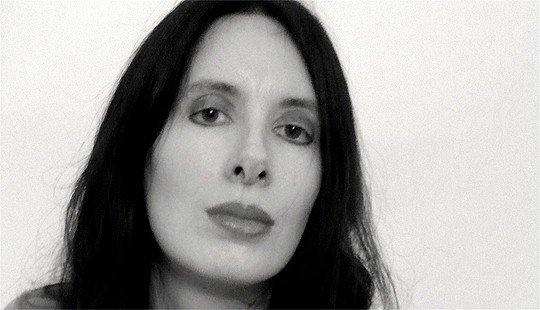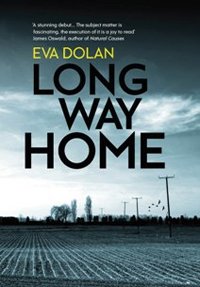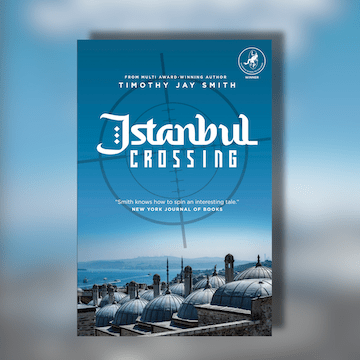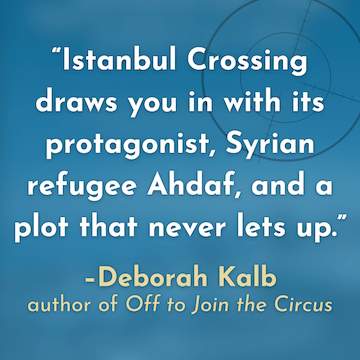 On 2 January, Eva Dolan’s first novel will be released by Harvill Secker. It’s big news for the Essex-based author, and for Crime Fiction Lover. For over two years, she’s been a contributor here on the site as LoiteringWithIntent, and all the while she’s been working away at her novel, blogging about crime fiction, and copywriting for a living. Finally, her book Long Way Home is becoming a reality. It sees DI Zigic and DS Ferreira called in to investigate a hate crime in the Peterborough area. The victim is a migrant worker, and both a far-right arsonist and a slum landlord soon come into the mix as suspects. We asked Eva to drop by and answer a few questions about her debut novel…
On 2 January, Eva Dolan’s first novel will be released by Harvill Secker. It’s big news for the Essex-based author, and for Crime Fiction Lover. For over two years, she’s been a contributor here on the site as LoiteringWithIntent, and all the while she’s been working away at her novel, blogging about crime fiction, and copywriting for a living. Finally, her book Long Way Home is becoming a reality. It sees DI Zigic and DS Ferreira called in to investigate a hate crime in the Peterborough area. The victim is a migrant worker, and both a far-right arsonist and a slum landlord soon come into the mix as suspects. We asked Eva to drop by and answer a few questions about her debut novel…
First off, tell us how you got into writing crime fiction, and how you landed your book deal with Harvill Secker?
I’ve always written, ever since I was a little girl, but coming around to crime was a gradual process, inspired by an accumulation of experiences and advice which took me away from my teenage obsession with horror and sci-fi. Once I made the switch it just felt right, so I guess I was probably always criminally minded. As for landing the deal with Harvill Secker, after 10-plus years of writing for ‘pleasure’ I produced a book I thought might be good enough to interest an agent – which it did – but not a publisher. Fortunately my next attempt, Long Way Home, landed on Alison Hennessey’s desk at Harvill Secker and she snapped it up.
What do you think crime fiction lovers are going to love about Long Way Home?
My aim with Long Way Home was to write a pacy and compelling police procedural like the ones I love reading, but set in a world which is still quite unfamiliar to people. I hope they’ll enjoy the plots twists and find themselves rooting for Zigic and Ferreira as they try to unearth the truth in a hostile environment where, as police, they are considered more of a threat than the brutal gangmasters and dodgy landlords who hold sway. But mostly I hope they’ll be intrigued by the world the book is set in, just as I was when I started researching it.
What were the main inspirations behind it?
Inspiration struck in unlikely location, a pretty country pub where two men were discussing the business practices of a local gangmaster, how he used threats and outright violence to maintain control over his workers. The admiration for his inhumane approach stuck with me and I realised it was a situation I wanted to explore.
 Peterborough and its environs are not that well known even within the UK, other than perhaps for being a bit dreary. What made you choose this setting and how have you brought it to life?
Peterborough and its environs are not that well known even within the UK, other than perhaps for being a bit dreary. What made you choose this setting and how have you brought it to life?
Peterborough is one of those places most people only see through a train window, a relatively small, post-industrial city with very little to mark it out. Except that in the last 15 years it’s experienced a population boom thanks to the arrival of a hotly debated number of economic migrants, bound for jobs in agriculture and food processing. This makes Peterborough one of the first stops when the media wants to illustrate the immigration debate and a perfect setting for a crime novel exploring the precarious existence of many migrants.
Bringing those areas to life was a matter of research on the ground, talking to people who know that world, walking the streets, getting a feel for the place. Hopefully it shows on the page.
With the murder of an immigrant starting things off, and two cops whose backgrounds are from overseas, both immigration and exploitation come across as themes in the book. What interested you about these themes and in what ways do you feel topical issues can enhance crime fiction stories?
For me crime novels can be greatly enhanced by a focus on topical issues, because as an author you have the opportunity to gather together all the reporting and research and distil it into a fictional narrative, which exposes the truth while hopefully gripping the reader.
Immigration in particular interests me because it places people in an uncertain situation, removed from their homes and their support networks, it’s inextricably linked with criminality, from the traffickers at the beginning of the journey to the slum landlords and dubious gangmasters at this end. It’s also a subject currently dominating political discourse in this country, one which might well decide the outcome of the next general election, and yet along the way the people at the heart of it are being at best ignored and at worst vilified, and I wanted to try, in my humble way, to balance that out.
Tell us more about our heroes Zigic and Ferreira – what is their working relationship like?
Zigic is a family man, a good copper, honest, conscientious, the kind of detective who believes answers are found by talking to people not kicking down doors. He can hold his own in a fight but he’d avoid starting one. Ferreira is much more gut-led, more cynical, and even though they’re both of foreign extraction she’s the one who was born abroad – in Portugal – and has grown up as an outsider, so she’s got a touch of the moral crusader about her. They have a constructively fractious working relationship, which in my experience is the best kind; sparks fly, backs go up, and in all of that ego-driven thunder the solution tends to present itself. But there’s a strong, mutual respect between them.
Can you tell us more about the villains too?
The terrible thing about my villains is that they’d consider themselves business people. Not bad or evil, just effective man managers. And they exist out in the real world by the thousand, fleecing their victims under the guise of being employment agencies or landlords, getting away with it because companies aren’t interested in the real price of cheap labour. But as dark as the book gets I’m afraid the truth is still worse.
What’s next for you?
I’m just putting the finishing touches to the first draft of the next Zigic and Ferreira book – currently, stubbornly untitled – then, come the New Year, I’ll be going out around the country promoting Long Way Home, which is an extremely thrilling prospect.
See our review of Long Way Home here on Crime Fiction Lover, or order your copy below.










Having read the book, and being a born-and bred native of Peterborough, I have to say that the picture she paints of my city is inaccurate.
The river is NOT brown and diseased looking and Peterborough is NOT a place with little to commend it. It has a magnificent Norman (not Gothic) cathedral which has one of the finest west fronts in Europe. Immigration is not recent – many Italians came after the War, followed by Asians in the 1950s and all have been assimilated.
What really got me about the book was that the few non-migrants are all racist , ugly or criminal. Even their washing-up water is ‘scummy’! The Irishman is a pimp, gambler and semi-criminal, and the English are all vile. Racism from someone trying very hard to be PC!?
I spend a lot of time in the area she describes and have NEVER seen an EDL poster – there are very few ‘white’ people living there and I seriously doubt if a Pakistani , Italian or Eastern European resident would put one up!
I shan’t be reading any more – only read this because it was a book club choice. It is racist – yes, you can be racist towards white people and the English – gets a number of its facts wrong, and Ferreirs is a walking cliche!
Nice bit of local patriotism. But I think this seriously overestimates the charms of the home of the Posh. In surveys of “my hometown is crap and I want to move out”, Peterborough regularly comes out top. UK # 1. My grandmother came from there, and never wanted to go back. I’ve been a few times. There’s a kind of atmosphere of humming hostility and resentment that keeps my visits down to the minimum.
I would not recommend this book. It feels like propaganda for immigrants. The author is very anti English people. It is a good plot but I would enjoy it more if I didn’t feel I was being lectured to.
I’ve read two of Eva’s books and thought she tackled some very difficult issues extremely well. Some immigrants in the stories appear as heroic, some are villains, and the same goes for the English people. Some are seen to be kind and generous while others are nasty, racist and exploitative. A bit like real life, really.